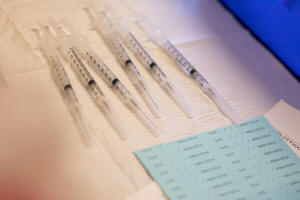Explainer - Updated COVID-19 vaccines are coming in the U.S., should you
get one?
 Send a link to a friend
Send a link to a friend
 [August 25, 2022]
By Ahmed Aboulenein and Julie Steenhuysen [August 25, 2022]
By Ahmed Aboulenein and Julie Steenhuysen
WASHINGTON/CHICAGO (Reuters) - The United
States plans to roll out an updated COVID-19 booster vaccine to include
Omicron subvariants of the coronavirus. Regulators are reviewing the
shots and could give the go-ahead as soon as next week.
Here is what you need to know:
ARE WE GETTING NEW VACCINES?
Pfizer Inc with partner BioNTech SE and Moderna Inc completed
applications this week to the U.S. Food and Drug Administration for
COVID-19 vaccine boosters retooled to target versions of the Omicron
variant of the virus.
These so-called bivalent vaccines include both the currently dominant
BA.4/BA.5 Omicron subvariants and the original version of the virus.
The Pfizer vaccine would be for people aged 12 and older, while
Moderna's would be for those 18 and older.
The FDA will likely decide on the vaccine soon. The U.S. Centers for
Disease Control and Prevention (CDC) has scheduled a two-day meeting of
its expert advisers beginning Sept. 1, a step that typically follows FDA
authorization.

The United States has ordered 175 million doses from Pfizer/BioNTech and
Moderna, which are expected to be ready to ship in September.
WHO SHOULD GET AN UPDATED BOOSTER?
Government health officials say the boosters are needed because immunity
wanes over time and the vaccines help prevent serious disease and death.
Several experts said they do not expect the updated vaccines to be game
changing and urged public health officials not to overstate their
benefits.
"What the administration is asking us to do is to accept this bivalent
vaccine is significantly better than the current ancestral strain
vaccine. It would be nice if there were data to support that," said Dr.
Paul Offit, an infectious disease expert at the University of
Pennsylvania and a member of the FDA's vaccine advisory panel.
"Right now, what they're asking you to do is trust them, and to trust
them with mouse data, and I think that's a lot to ask."
Currently, a fourth shot, or second booster, is restricted largely to
people over 50 and those who are immunocompromised or at high risk. The
government plans to open the Omicron boosters to people from age 12,
according to a CDC document.
[to top of second column]
|

Syringes ready to be administered to
residents who are over 50 years old and immunocompromised and are
eligible to receive their second booster shots of the coronavirus
disease (COVID-19) vaccines are seen in Waterford, Michigan, U.S.,
April 8, 2022. REUTERS/Emily Elconin
 People in these same risk groups are
most likely to benefit from the new boosters, said Dr. Celine
Gounder, an infectious disease epidemiologist and an editor-at-large
at Kaiser Health News.
"If you don't fall into one of those categories, it's really a toss
up as to how much additional benefit you're going to get," she said.
Gounder recommends those who have recently gotten a booster or
COVID-19 wait at least three months to give the immune system the
best chance to mount a robust response.
John Moore, a professor of microbiology and immunology at Weill
Cornell Medical College in New York, said the most important boost
is the first one. "Anyone who has not received that boost should do
so as soon as possible, and irrespective of the composition of the
vaccine," he said.
WHAT DOES THE DATA SAY?
Pfizer has presented data on its BA.4/BA.5 booster from studies in
labs and animals. The company says it generated a strong
neutralizing antibody response against those and other Omicron
variants, as well as the original strain of the virus.
The company provided regulators with data from a human trial testing
the immune response of a shot that combined the original vaccine
with the BA.1 Omicron variant. It plans this month to start a
similar trial of the BA.4/BA.5 booster in those aged 12 and older.
Moderna's application to the FDA includes data from animal studies
of the BA.4/BA.5 booster. A mid-to-late stage trial for the vaccine
in people is underway.
(Reporting by Ahmed Aboulenein in Washington, Julie Steenhuysen in
Chicago and Mrinalika Roy in Bengaluru; Editing by Caroline Humer
and Bill Berkrot)
[© 2022 Thomson Reuters. All rights
reserved.] This material may not be published,
broadcast, rewritten or redistributed.
Thompson Reuters is solely responsible for this content.
 |